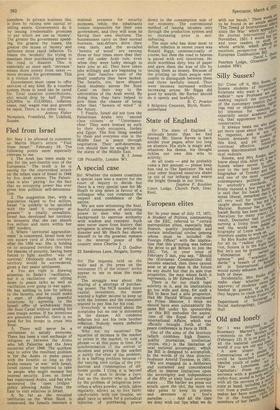A special case
Sir: Whether the miners constitute a special case was a matter for the court of inquiry to decide but there is a very special case for Mr Heath to step down in favour of a colleague who can command the respect and confidence of the nation. We are now witnessing the final, fearful consequences of entrusting power to men who lack the background to exercise authority with wisdom and restraint. Such men never learn from history that arrogance is always the prelude to disaster and Mr Heath has shown himself to be the greatest menace to the internal peace of the country since Charles I.
J. D. Godber 22 Sandcross Lane, Reigate, Surrey
Sir: The inquests held on the radio and in the press on the settlement (?) of the miners' strike appear to me to miss the main point. The struggle was about the sharing of a shortage of purchasing power. The NCB needed more capital investment, the miner wanted a higher income to keep up with the Joneses and the consumer wanted to pay less for his coal. Everybody is worried about the symptoms but no one is interested in the disease. All condemn inflation but not his twin brother reflation. Nobody wants deflation or stagnation.
Why not try equation? The equation of incomes in the market to prices in the market, to coin a phrase — at this point in time. For synchronisation ef the arrival of incomes and prices in the market is surely the crux of the problem. It is a baffling problem because t.f the varying time cycles of the rroduction and consumption of different goods. I thing it is beyond the wit of man tc devise a cure. Just as the doctor who is baffled by the problem of indigestion prescribes a white powder, which, taken regularly, allows us to live fairly comfortably with our trouble, we shall have to settle for a periodical injection of purchasing power
direct to the consumption side of our economy. The conventional method of issuing incomes only through the production system and so increasing price is selfdefeating.
The man who has done most to defeat inflation in recent years was Ronald Biggs, unintentionally of course, but then the road to heaven is paved with evil intentions. He stole worthless dirty bits of paper and gave them the kiss of life by issuing them as money. Because of the printing on them people were unable to distinguish between them and these lawfully issued. Thus were incomes increased without increasing prices. Mr Biggs did good by stealth. Mr Barber should do it openly and lawfully. R. C. Proctor 6 Belgrave Crescent, Blyth, Northumberland










































 Previous page
Previous page